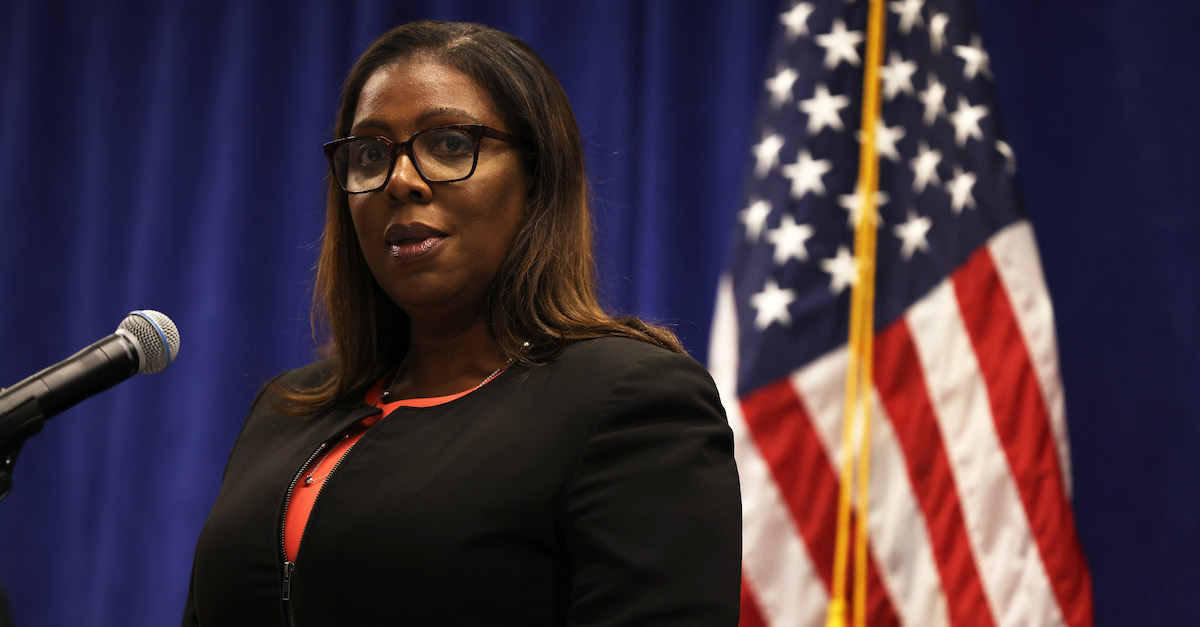
New York State Attorney General Letitia James speaks during a press conference announcing a lawsuit to dissolve the NRA. (Photo by Michael M. Santiago/Getty Images)
Trying to stave off a First Amendment lawsuit against New York’s online hate speech law, the Empire State’s attorney general Letitia James (D) told a federal judge on Wednesday that a law professor and two social media platforms that sued her have the statute “wrong.”
“Plaintiffs’ action is based on a fundamentally incorrect reading of the statute,” her special litigation counsel Seth J. Farber wrote in a 34-page legal brief, emphasizing that the statute “does not regulate” speech. “Nowhere in the statute is a social media network required to remove so-called “hate speech” —or any other kind of speech — from any platform. And nowhere in the statute is a social media network punished or penalized based on content or viewpoint.”
First Amendment scholar Eugene Volokh, a UCLA law professor who runs the blog the Volokh Conspiracy, disagrees — and filed a federal lawsuit with the platforms Rumble and Locals to oppose it.
The law forces social media networks to publish a policy explaining how they will clamp down on speech perceived to “vilify, humiliate, or incite violence against a group or class of persons” based on race, color, religion, or other protected categories. Those websites then must create a mechanism to enforce their policies — and failing to do so could earn them heavy fines, the lawsuit says.
James’s office characterizes the law as requiring websites to create little more than an “electronic ‘complaint box.'”
“This prevents user confusion and deception about a network’s policies,” the legal brief states. “There is no requirement that a social media network adopt any particular policy and no requirement that a social media network respond to or address a report in any particular manner. A social media network may have a policy to do nothing.”
During an interview with Law&Crime, Professor Volokh argued that even this is a bridge too far to pass First Amendment muster.
“I do think that under the statute, I probably wouldn’t be allowed to have a policy that says, ‘I don’t delete speech that vilifies or humiliates based on religion and the like,'” Volokh told Law&Crime’s podcast Objections: with Adam Klasfeld. “But I don’t even want to have any policy that singles that out for special treatment.”
A passage of the attorney general’s reply brief focuses on the terrorist act that inspired New York’s hate speech law: a white supremacist’s mass shooting of Black shoppers at Tops grocery story in Buffalo, New York.
“The attack left 10 Black people dead and three others wounded,” the attorney general’s brief notes. “Within hours, a recording of the livestream went viral on social media. […] Before the shooting began, the shooter published a manifesto touting his racist views and calling for the mass killing of Black people. […] That, too, was shared widely on social media. […] The shooter’s expressed intention in livestreaming his attack and posting his manifesto online was to inspire others to follow in his footsteps and commit racially motivated murder.”
James notes that act “was not the first time that social media had been used to carry out and incite mass murder,” pointing to the 2019 massacre in Christchurch, New Zealand. That racist gunman also livestreamed his attacks, which in his case targeted two separate mosques, killing 51 people.
The Buffalo gunman, Payton Gendron, recently pleaded guilty to all of the state charges against him, but the federal counts remain pending.
Whatever its intentions, the challengers of the law claim, the statute can be used to punish speech more broadly. They call the language “vilify, humiliate, or incite violence against a group or class of persons” broad and poorly defined, potentially allowing a clampdown on opinions critiquing organized religion or national policies.
Listen to Law&Crime’s interview with Volokh, the statute’s lead challenger, on the podcast Objections below: